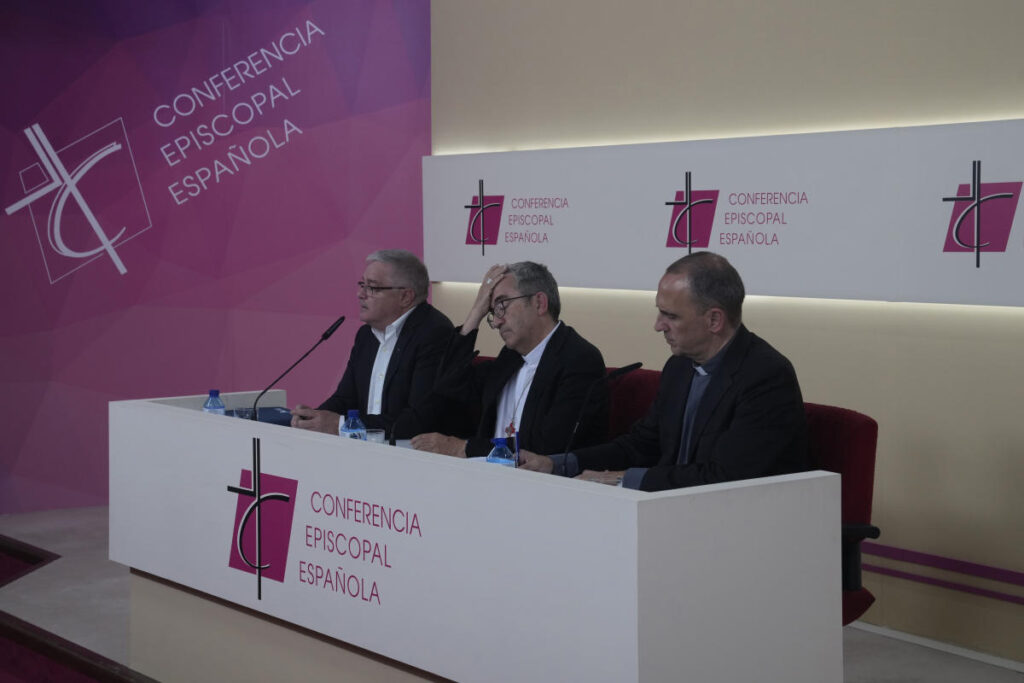BARCELONA, Spain (AP) — Spain’s Catholic bishops on Tuesday approved a plan to compensate victims of sexual abuse within the church whose alleged attackers have died or whose possible crimes have been banned, a move the government and victims’ groups called lacking real guarantees.
The Spanish bishops’ conference did not give an estimate of how many victims it was able to help. But last year the conference said it had found evidence of 728 sexual abusers within the church since 1945 as part of its first public report after years of rejecting a comprehensive approach to investigating sexual abuse.
According to the conference, 75 percent of the cases occurred before 1990 and more than 60 percent of the perpetrators were deceased.
Last year a survey of the Spanish public Ombudsman Office indicated that the total number of victims, including minors, could be much, much higher.
The president of the Spanish Bishops’ Conference, Luis Argüello, said at a press conference in Madrid on Tuesday: “Our work does not begin or end today, but today is important.
“Since most cases date from before the 1990s, many cases cannot be prosecuted due to the statutes of limitations that limit ordinary law.”
The clergy’s move comes after The Spanish government has approved a plan last year to force the church to pay economic compensation to victims of abuse.
The church’s plan includes a plank for “material reparations” for victims, which could include financial compensation and payment for medical or therapeutic services. The church promised to carry out “economic, spiritual and psychological” reparations for victims.
It also includes the Church’s commitment to uncover the truth about an alleged case of sexual abuse, even when the alleged perpetrator is dead.
“There is always a judicial redress, but for those cases that are time-barred according to ordinary and canon law and that cannot be reopened because of the statute of limitations or because the aggressor is dead, we believe that the Church has a moral duty towards these people,” said Jesús Díaz Sariego, president of the Spanish Conference of Religious Orders, who, together with the bishops, supports the plan.
Each case will be handled by a newly created committee of experts who will advise each diocese on the best way to help each victim.
The advisory board will be made up of 10 people, four medical experts, four criminal justice experts and a representative of the Bishops’ Conference and the Spanish Conference of Religious Orders. The new council could then bring in a representative of victims’ associations to work with the council, the Bishops’ Conference said.
For cases of abuse that can be prosecuted, the church also has offices where victims can go.
Argüello said the church had listened to the recommendations of both the Ombudsman and victims’ organizations, but the Spanish government and some victims’ organizations said the plan fell short.
“We don’t believe in the church’s plan,” Juan Cuatrecases, spokesman for the victims’ association Robbed Childhood, told Spanish national radio. Cuatrecases said the plan had no government oversight.
The day before the Church presented its plan, the Spanish government issued a statement saying it rejected a unilateral and ineffective attempt at recovery.
The statement said the church will not accept the church’s plan because “its resolutions are not binding and therefore do not guarantee recovery in any way.”
Arguello said all 67 bishops who attended the extraordinary meeting in Madrid supported the plan, with only one abstention on one of the three approved documents.
Only one a handful of countries have had government-initiated or parliamentary inquiries into clergy sexual abuse, although some independent groups have conducted their own investigations.







